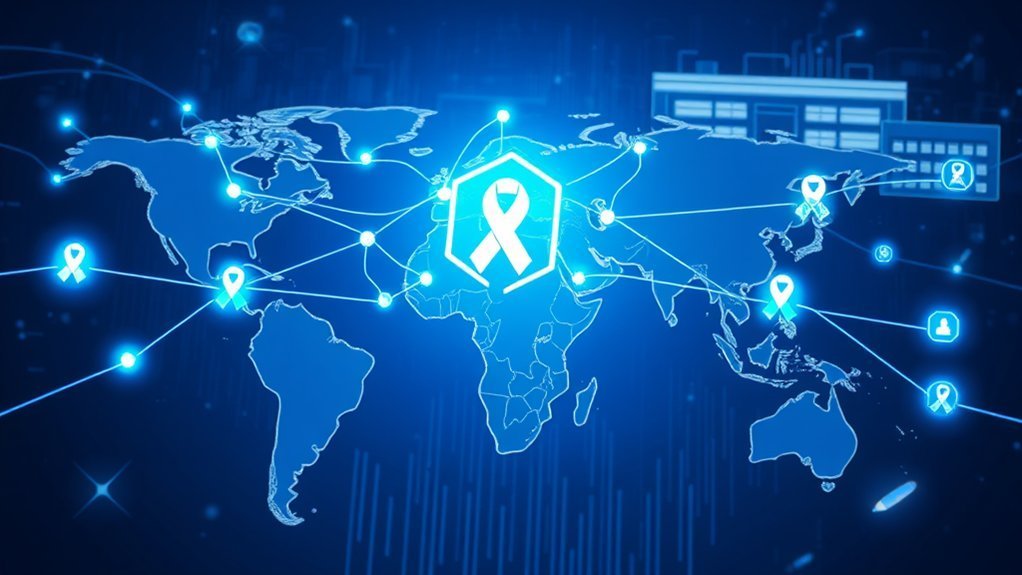Big talk about Blockchain Solutions for HIV Prevention and Treatment. It’s supposed to keep everyone’s sensitive info private, ultimately. Data gets shared, but securely, somehow building trust. Think digital wallets and self-sovereign identity, putting *you* in charge of your health info. Helps with PrEP care, maybe even reduces stigma. Yeah, it’s complex tech, and laws are playing catch-up, whatever. But the potential for better care, especially for those who really need it? Pretty sweet. Let’s break it down.

Okay, so blockchain, like that digital money thing, is supposed to fix healthcare stuff now, specifically for HIV prevention. It’s supposed to be this whole decentralized, secure, and transparent deal. Think community-wide data sharing without some big boss in charge. Supposedly, it keeps things confidential, vital for sensitive stuff like HIV status. But despite international assistance, there has been a lack of effective curtailment in the spread of HIV. Plus, every move is recorded, all transparent, building trust. And it makes data sharing and care coordination easier, which, honestly, sounds pretty good.
Blockchain aims to make HIV data sharing secure, transparent, and easy.
They’re using this tech for PrEP care, which is a pre-exposure thing. Improves how data is shared, makes it more about the client. There’s even this whole “digital vaccine” concept, using blockchain for surveillance and to, like, curb risky behavior. Data management, they say, is secure and keeps privacy intact. It’s even supposed to get marginalized groups to actually get help for HIV prevention. Anjum Khurshid and Daniel Toshio Harrell are listed as authors exploring these concepts.
And get this, users can handle their own identity and health data with these “digital wallets.” Self-sovereign identity, they call it. Sounds fancy.
Platforms are popping up too, like PrEPLinker, designed to make PrEP care better, giving clients more control over their data and making care coordination smoother. There’s also TestLinker, part of a pilot project initiated by CHPPR investigators. They’re using decentralized apps, or DApps, for strategies like those digital vaccines. Blockchain structures supposedly help with secure data sharing across different health providers. It’s all about a patient-centered approach, enabling people to manage their own health data.
The supposed benefits of Blockchain Solutions for HIV Prevention and Treatment? Privacy and security, obviously. Efficient data sharing between doctors and stuff. Better care coordination for things like PrEP. It supposedly helps with health equity roadblocks, which, you know, is a big deal. And it might even reduce stigma, making it easier for folks to get help. Because, let’s be real, accessing these services can be tough. The costs are remarkably lower too, with transaction fees typically under 1% compared to traditional payment methods.
But, come on. It’s complicated. Requires serious tech brains. The laws aren’t really set up for this yet. Scaling it up widely is a pain. Getting people, doctors and users, to actually adopt it is another hurdle. And making different systems talk to each other? Interoperability, they call it. Yeah, that’s a problem too.
Frequently Asked Questions
Is Blockchain Energy Efficient?
Some blockchains are energy efficient, some aren’t.
Depends on how they’re built. Proof of Work, yeah, uses a ton of power. Like, crazy amounts. Think Bitcoin.
But Proof of Stake? Much, much better. Seriously, it’s nowhere near as bad. Tezos is a prime example. Consumes way less energy.
Can Blockchain Replace Human Doctors?
Blockchain can replace human doctors? Seriously? Nah.
Blockchain handles data, right? Secure data. Cool. But diagnosing folks, that takes more. Skills, experience. Stuff computers don’t get.
Like, empathy. And complicated cases? Humans win. Machines are good, but not *that* good. Don’t kid yourself.
Is Blockchain Regulation Difficult?
Is blockchain regulation difficult? Yeah, it is.
Legal structures? Complex.
HIPAA and HITECH compliance? A pain.
Steering international data sharing? Good luck.
Requires oversight because, you know, sensitive data.
Doesn’t fix lousy data governance either.
Regulatory standards are needed, obviously.
It’s a mess.
What Is the Future of Blockchain in Healthcare?
The future of blockchain in healthcare, seriously?
It’s supposed to get fancy with AI for personalized medicine.
And link up with IoT for real-time tracking – like, knowing exactly where your grandma’s meds are.
Maybe they’ll ultimately nail down supply chains.
Predictive medicine is a big deal.
Telemedicine too.
Sounds convenient, maybe costly.
Is Blockchain Immune to Hacking?
Is blockchain immune to hacking? Nope, definitely not.
While its decentralized setup and fancy encryption make it harder, glitches and attacks are real. People lose serious cash.
Smart contract bugs? Yeah, that happens.
Fifty-one percent attacks? Still a thing.
Malware and phishing are old school but still effective against users.
Hackers, bless their hearts, keep finding ways.
